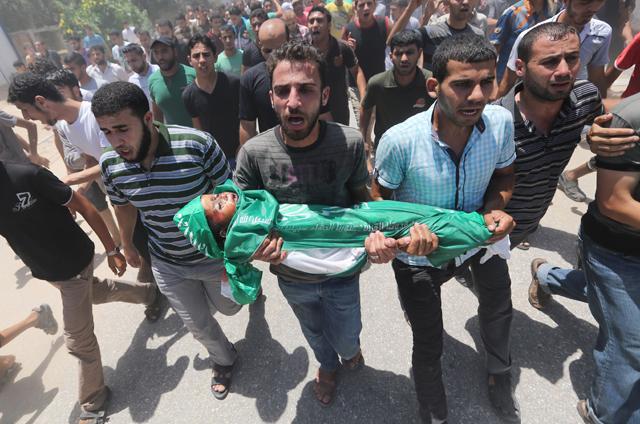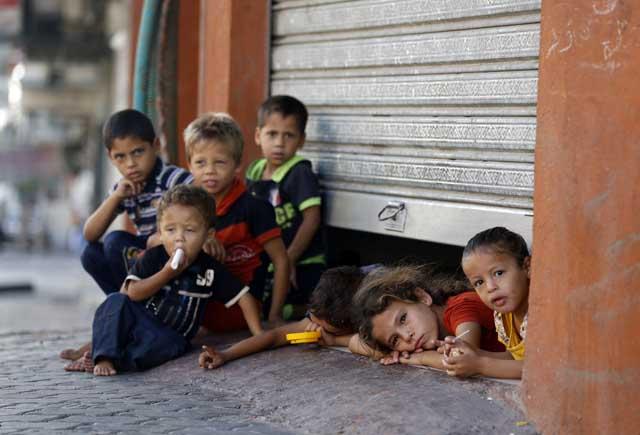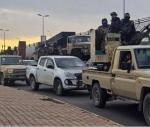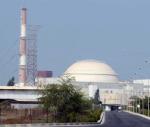You are here
Hamas drifts into Gaza fight it doesn’t know how to finish
By Reuters - Jul 10,2014 - Last updated at Jul 10,2014

GAZA — The latest mini-war between Israel and the Islamist group Hamas began with the Gaza-based fighters eager to strike a blow, but the escalation that followed has left them physically and diplomatically exposed, with no ready way out.
Hamas has sent its rockets streaking into Israel after a month of army raids in the occupied West Bank — in search of three missing settler teenagers — that landed more than 900 Palestinians in jail, many of them Hamas members.
The self-styled Islamic Resistance Movement was further prompted to action by widespread anger at the burning alive of a Palestinian youth by suspected Jewish extremists last week, an apparent revenge attack after the missing teens were found shot dead in the West Bank — murders Israel blames on Hamas.
Hamas said it hadn’t sought a war, but now hundreds of Israeli bombs continue to pound the coastal strip, killing scores of Gazans — almost all of them civilians, according to Palestinian medical officials.
It says the onus for ending the hostilities is on Israel, where the rocket attacks have caused no fatalities and whose missile defence system has intercepted many of the Hamas projectiles.
“Yes, we want calm. We don’t like escalation, and we didn’t make an escalation. [Israeli Prime Minister Benjamin] Netanyahu imposed this aggression upon us,” Hamas leader Khaled Mishaal said in a speech broadcast on Wednesday.
“To end his aggression, first end his policy of occupation, settlement, Judaisation, detentions, killings and demolitions. End that first. Our people deserve to live free,” he added.
Hamas orphaned
Previous lopsided battles between Palestinian fighters and Israel’s powerful military — most recently an eight-day conflict in 2012 and a month-long tussle that began in late 2008, and included a ground invasion of the Gaza Strip — have left Hamas’s position mostly intact.
The group would claim victory, buoyed by some international sympathy, speedily replenish their cache of rockets through Gaza’s porous border with Egypt and maintain its broad presence in the West Bank.
But much has changed since.
In Egypt, the military has ousted the ruling Muslim Brotherhood, a key ally to the Gaza government, which helped mediate a truce in 2012.
And it will be harder to restock when hostilities end now that Egypt’s new government has stepped up efforts to demolish the cross-border tunnels that fed not only the blockaded coastal strip’s weapons caches but its entire economy.
Gaza was once the favoured cause of regional powers, but with Egypt now openly hostile, and stalwart backers Turkey and Qatar distracted by the lightning rise of Islamist extremists in Iraq, Hamas has found itself orphaned.
“Turkey and Qatar may play a role in trying to restore calm, but they have no direct influence on the occupation, which makes their position weak,” said Hamza Abu Shanab, a Gaza political analyst.
In the West Bank, too, where it is always under the jealous eye of secular Palestinian rivals, Hamas’ fortunes have hit a new low with Israel’s arrests.
“Israel is holding all Palestinians responsible for the killing of the three Israelis, and that’s what it’s doing with the campaign of arrests everywhere in the West Bank, and it’s extended this policy of collective punishment now to Gaza,” Hamas MP Fathi Qarawi told Reuters.
“Hamas was forced to make a response, and events have developed. We want a truce... Egypt can still play a role and a good role in pressuring Israel to stop its attacks,” he said.
Bleak bargain
Securing a truce, however, is not simple when a determined military showing is considered a matter of pride and honour.
Mishaal expressed glee at the group’s ability to lob its long-range rockets at Israel’s commercial capital Tel Aviv and for unprecedented distances deep into its north.
Despite the death and pain wrought on Gaza’s citizens, Hamas says it has the means to carry on a long campaign if it must.
“Whoever thinks Hamas’ ammunition will run out in days, weeks or months is delusional. We have lots in our pocket,” senior Hamas official Mushir Al Masri said on Wednesday.
“We want to bring you to your knees and achieve victory,” Masri told Aqsa TV.
The tough rhetoric, however, is in part a cloak for weakness at home, where deepening poverty and hardship in Gaza helped push the group into a troubled unity government with the Fatah Party headed by Palestinian President Mahmoud Abbas.
“Hamas is extremely weak now. Weaker than ever before. It capitulated entirely to Abbas’ demands in forming a reconciliation government. Gaza is in economic crisis. Hamas is bankrupt and doesn’t have a friend left in the world,” said Gershon Baskin, an Israeli peace activist and analyst.
Baskin ran back-channel negotiations that led to the release in 2010 of an Israeli soldier abducted by Hamas in exchange for over a thousand Palestinian prisoners. He says fractures within the group may hinder a quick ceasefire.
“There are power struggles within [Hamas]... and it lacks an authoritative command. It’s a mess inside. But if there’s one thing all parts of its organisation agree on, it’s that an Israeli attack on Gaza builds up sympathy for it there, the West Bank and the Arab world,” he told Reuters.
If so — and Israel has hinted it could launch a ground offensive into the Strip to decisively pare back Hamas’ capability — it is a bleak bargain.
An infantry and tank drive may give Hamas more opportunities to impose casualties and even abduct Israeli soldiers and trade them for Palestinian prisoners, said Firas Abi Ali, an analyst at IHS Country Risk in London.
“Our backs are to the wall and we have nothing to lose,” Hamas spokesman Sami Abu Zuhri said on Thursday.
“We are ready to undergo the battle up to the end, and we are determined to confront the occupation,” he added.
Related Articles
Fighting subsided in Gaza on Sunday after Hamas said they backed a 24-hour humanitarian truce, but there was no sign of any comprehensive deal to end their conflict with Israel.
PARIS — The surprise assault by Hamas against Israel was a meticulously planned offensive that the Palestinian militant group is capable of
Hamas rejected on Saturday as insufficient offers made in Cairo to Palestinian negotiators seeking to end Israel’s offensive in the Gaza Strip and raised the possibility of renewed fighting when the current truce expires.
















